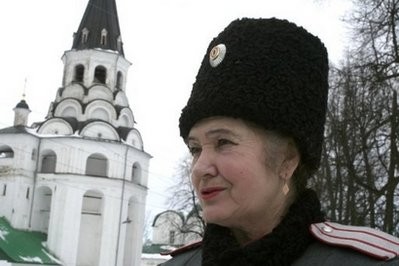Dressed in the red and black uniform of the Cossacks, a sabre sheathed at her side, Yulia Tkachenko is the only woman "ataman" or leader of the legendary warriors, but there is no doubt who is in charge.
To an outsider it might seem a strange sight. But Tkachenko sees nothing incongruous in her role.
"Today, the men are a bit weak," she says. "They are helpless ... the women are stronger. Maybe not physically, but morally certainly, we are the stronger."
Tkachenko, a small, grey-eyed woman of 66, is dwarfed by the Cossack troops under her command, each one of whom is at least a good head taller.

But there is no doubt who is in charge, for it is she who issues the orders assigning each team the territory they are to patrol.
Tkachenko and her men help ensure security in the Alexandrov region, about 100 kilometres (62 miles) from Moscow. Working alongside the local police and fire services, they patrol the region on a purely voluntary basis.
"We want our Russia to be strong and it is the role of the Cossacks to help get the country back on its feet," she says.
The Cossacks were originally warriors in the service of the tsar.
Crushed as counter-revolutionaries by the Bolsheviks after the 1917 Revolution, they were persecuted during the Soviet era.
But in the post-Soviet era, the Cossacks have enjoyed a resurgence of the culture. Today, 740,000 people are recorded as Cossacks in Russia, according to official statistics.
About 10 years ago, Tkachenko decided to revive the Cossack community in the Alexandrov region. She mobilised the youth and registered the Cossack presence with the authorities in Moscow.
It was this activism that earned her current position at the head of the 320-strong Cossack troop.
"Yulia Pasalkovna is our mother," says Vladimir Stukatchov, referring to Tkachenko by her patronymic, the name derived from her father.
"She tells us to this or that and we obey her with pleasure. It's not like a chief who gives orders, it's more like a mother who asks," says the 50-year-old Cossack.
"Yulia, she's our Russian Joan of Arc," he adds.
But not everyone has accepted her election as head of the troop.
The Cossacks are traditionalists: their values are church, family and country.
One local cossack, Valentin Gusev, who runs a garage in Alexandrov, does not approve of Tkachenko's status.
"It's not good that a woman is ataman. There are rules," he says. "You must not break with the traditions."
Tkachenko is aware of the hostility among some sections of the community: she says she has even received threats.
"I'm not afraid," she says. "I'm brave. You only die once, that's why I'm not afraid of death.
"I will fight to the end to accomplish my mission," she adds.
She is determined to be worthy of her origins, which according to family legend has her as a descendant of Yermak, one of the most famous of Cossack chiefs whose exploits include the conquest of Siberia.
After a hard day's patrolling, Tkachenko goes home, exchanges her uniform for a dress and applies a little lipstick.
"Out there, I am ataman, I have my uniform and I go to fight.
"But once I come home from combat to the house, I am a woman, I go to the stable, I milk my cow, I get the food ready and I am there for my family."
As she speaks, she is already preparing a meal of veal liver pastries for her son, her husband and any of the Cossacks who regularly come and eat with them.
"Why rest?" she asks. "I'll have plenty of time to rest after I'm dead!"
























